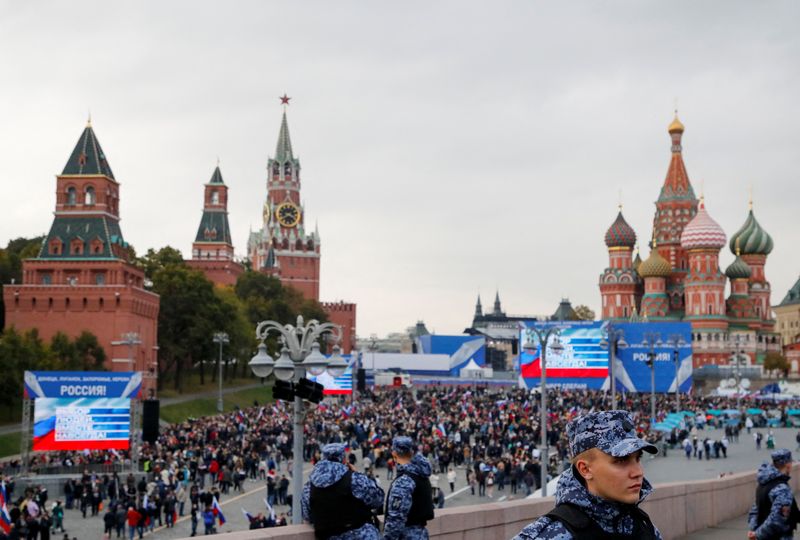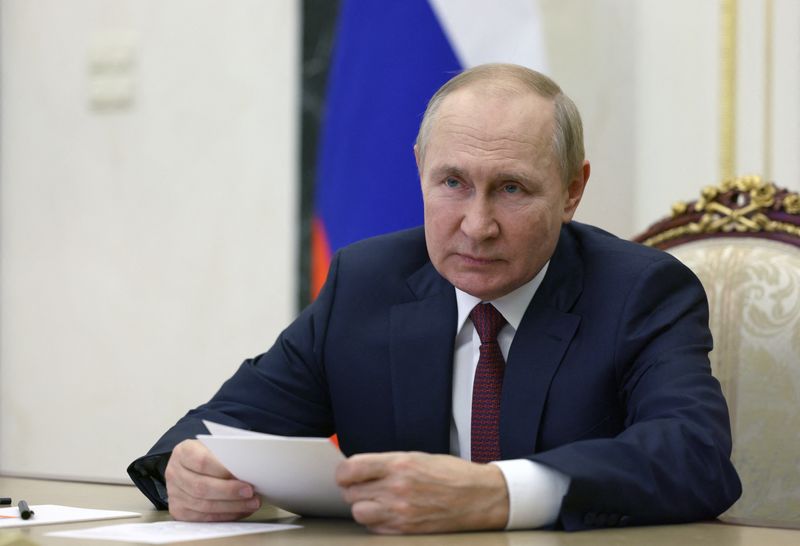By Mark Trevelyan
LONDON (Reuters) -It was billed as a historic ceremony to expand Russia's borders, but President Vladimir Putin was in no hurry to get the treaties signed.
Before inking documents to annex four regions of Ukraine - in an act denounced as illegal by Ukraine, the United States, the European Union and the head of the United Nations - the Kremlin leader delivered a 37-minute anti-Western diatribe that veered across an astonishing range of topics.
He hailed Russia's historic military might, railed against Western colonialism and ranged across a series of events from the 19th-century Opium Wars to the U.S. nuclear bombing of Hiroshima and Nagasaki, in a speech punctuated with applause and standing ovations.
He accused the "Satanic" West of rejecting morality and religion, launching into a tirade on the topic of gender identity.
"Do we really want to see perversions that lead to degradation and extinction be imposed on children in our schools from the earliest years, for it to be drilled into them that there are supposedly some genders besides women and men, and offered the chance to undergo sex change operations?" he asked, directing the question to "all citizens of Russia" as well as the assembled dignitaries in the Grand Kremlin Palace.
Missing from the speech - in a hall where Russian military heroes are commemorated with marble plaques engraved in gold - was any acknowledgement of Moscow's faltering war effort in Ukraine.
Even as Putin spoke, his forces 750 km (460 miles) to the south were being encircled in the Ukrainian city of Lyman, and Ukraine said Moscow would have to appeal to Kyiv if it wanted them to be allowed to leave.
FANFARES
The Ukrainian army was "trying at all costs to spoil our historic events", complained Denis Pushilin, leader of the self-styled Russian-backed Donetsk People's Republic, hours before the start of the Kremlin ceremony.
There was only a fleeting reference from Putin to the subject uppermost on many Russians' minds - the chaotic partial mobilisation that he declared last week, which has prompted thousands of fighting-age men to flee the country.
Despite the impressive choreography, with trumpet fanfares and high-stepping guards in dark blue uniforms, there were reminders that the annexation was rushed through in a manner that leaves many questions unanswered.
Russia controls only parts of the four Ukrainian regions it is annexing. At a briefing hours before the ceremony, Kremlin spokesman Dmitry Peskov was unable to say if it was claiming the whole of them or only those areas held by its troops.
With respect to the Kherson and Zaporizhzhia regions, "I need to clarify this. I cannot answer this question", he said.
As with the 2014 seizure of Crimea, the annexations followed hastily conducted referendums in the occupied areas, which Ukraine and the West called sham, illegitimate exercises held at gunpoint. Even traditional Russian allies such as Serbia and Kazakhstan have declined to recognise them.
The taking of Crimea was popular with many Russians, but opinions on the streets of Moscow on Friday were divided.

"I think it’s very good, wonderful. We’re all looking forward to having our new compatriots and fully support our government’s actions and believe in victory," said one woman, Yevgeniya Zhdanova.
Another, Liliya Potapkina, said she took a negative view. "I am afraid of this situation. I don’t understand it and so I don’t approve of this," she said.
